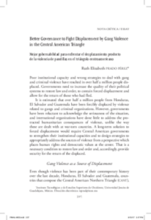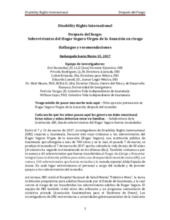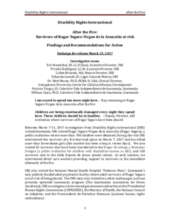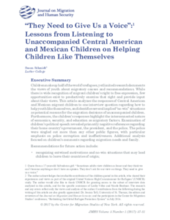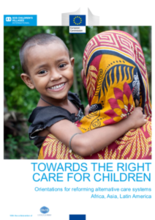Displaying 111 - 120 of 176
This article discusses knowledge on the traumas that this hidden, although expanding, group of youth experience, as well as the interventions, clinical services, and policies that can benefit these youth.
This essay examines the extreme violence and organized crime in the Central American Northern Triangle (CANT) region that is causing many young people, families, and individuals to flee and become displaced, as well as the widespread forcible gang recruitment in the region.
This chapter from Child Maltreatment in Residential Care provides an overview of institutional care in Latin America and the Carribean, describes current efforts toward deinsitutionalization and child care reform in the region, and discusses practical suggestions for further research and reform.
This study investigated and compared electroencephalogram (EEG) functioning between a group of institutionalized adolescents and a never institutionalized group of adolescents during a social decision making task.
This study investigated how adoptive and prospective adoptive parents in Spain deal with signs of fraud and corruption within the intercountry adoption process, illuminating the dismissal of the systemic failures of intercountry adoption and the rights of birth families.
Entre el 7 y 11 de marzo de 2017, investigadores de Disability Rights International (DRI) viajaron a Guatemala para entrevistar los sobrevivientes de vivienda institucional. Este documento presente la información recopilada y las recomendaciones de DRI a Guatemala.
DRI’s main finding is that survivors of the fire at Hogar Seguro Virgen de la Asunción face immediate danger – including detention in other institutions where they face continued segregation and abuse.
Save the Children is in search of a Regional Program Manager to work on its Regional Senior Management Team in Panama City, Panama. The initial contract term is two years initially.
TEAM/PROGRAMME:
This article analyzes the responses of Central American and Mexican migrant children to one interview question regarding how to help youth like themselves, and identifies several implied “no-win” situations as potential reasons for the migration decisions of unaccompanied children.
The general objective of this study was to conduct a research on the possible issue of institutionalisation in six South and Central American, Asian and African countries in order to strengthen the knowledge of the European Commission on the nature, the extent and scope of institutionalisation and feasibility of de-institutionalisation (alternative care for children).

